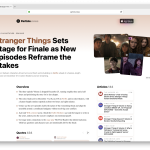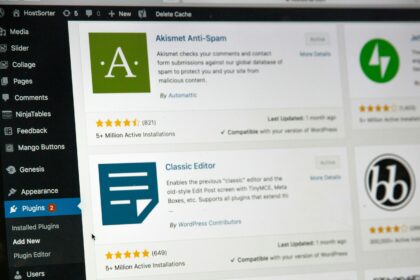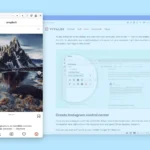For most of my life, I’ve been watching SEO experts recommending content creators to focus on low-difficulty instead of high-difficulty keywords for their SEO strategies, which I always found to be really, really bad advice. Here’s everything you need to know about low and high-difficulty keywords and why it’s important to focus on both.
What is keyword difficulty (KD)?
Keyword difficulty, or ‘KD‘, as the name suggests, is a measurement of how hard it is to rank in the first 10 (unpaid) search results. Both Google and Bing have their own keyword difficulties, based on various factors, such as popularity, the number of websites that want to rank for this keyword, and more.
Let’s say, for example, that you want to write a food recipe for scrambled eggs. Based on Ahrefs results, it has a 48/100 KD, and they suggest that a blog post for this keyword will probably need at least 77 backlinks from other websites to rank in the first 10 places. Another keyword may have a 90/100 KD, which is pretty high and amazingly difficult to rank in the first results.
Looking at those numbers, many content creators are making different and important decisions about the content they’re going to write, how to optimize it, and how much success it’s going to have if it ranks at the top of the results.
- Low Keyword-Difficulty: It’s easier to rank in the first 10 unpaid search results.
- Medium Keyword-Difficulty: It has some competition, but you still can rank in the top 10 unpaid search results.
- High Keyword Difficulty: Competition is so high that it’s almost impossible to rank in the first 10 unpaid search results.
But is it true? No, it is not, and yes, it is. I had many times in the past the wrong impression of how those SEO services and tools actually work and what they’re suggesting.
Backlinks are important, and the more mentions (backlinks) you get from other websites, the better your content is going to rank. That’s no secret in the SEO world, but should you only focus on low and medium-difficulty keywords and get as many backlinks as you can?
Nah, I’d say that you should stick to and focus on what Google and Bing are both recommending, and that’s creating high-quality content and putting your audience first, and search engines second. But we’ll come back to this in a bit.
Low-Difficulty vs. High-Difficulty keywords for low-traffic blogs
There’s a whole list behind how keyword difficulty works, but the overall quality of your content, both old and published blog posts, and your newest content, plays a significant role. For example, don’t expect Google and Bing to help your content rank better if all your oldest works are not high-quality.
There’s also the relation of your overall content/niche to what you’re currently writing, which means a tech blog is less likely to rank for food recipes, and vice versa. If you have been writing for a specific niche, then don’t be afraid to focus on high-difficulty keywords, as long as they’re related to your main topic.
With that in mind, is it possible to actually rank for high-difficulty keywords? While Google and Bing may pick your content as the best of the rest, putting it in the first unpaid results, there’s a list of ranking signals that go into play.
From the number of backlinks that your overall domain name gets from other websites mentioning it, the social media signals, the structure, and the Schema Markup types that have been implemented in the page, to having a website full of high-quality content, lots of things are happening behind the scenes.
If you’re new to the blogosphere and the SEO world, you’ll probably lack any amount of high-quality backlinks coming from third-party and well-known websites. The best way to start increasing your blog’s awareness is by investing time in writing guest blog posts for other blogs and websites that have a similar or the same niche as you.
But before doing all of that, make sure your blog has all the important content published, so it can start ranking better over time and as your backlinks increase.
Should new blogs only focus on Low-Difficulty Keywords?
Should you follow what other SEO experts are recommending? No, you shouldn’t, and yes, you should! But enough is enough, and you should always remember that not every SEO expert has it right, and many of us are still making mistakes that can cost someone else’s work – if they follow our tips, that means.
It’s important to keep investing in learning the more you can about SEO and everything that comes with it. It’s important to do your own research and not be afraid to take the road that leads to writing only for high-difficulty keywords and not just for low-difficulty keywords, which may never get you to the point that you want your blog to be in the near future.
If an SEO expert is recommending that you only focus on low-difficulty keywords, you should re-think if you want to hire him/her or follow their advice. By researching, you’ll be able to create an SEO strategy that includes both high-difficulty and low-difficulty keywords, but only what most people will actually search for when it comes to your niche.
As I always did with my blogs, I started by writing and publishing the most important and popular topics for my niche. After that, I went and covered everything else, from medium to low-difficulty keywords, and those that were also important and crucial for the overall structure of my blog. The funny thing is that some of my articles that were written for high-difficulty keywords ended up on Google’s first page, even when my blog was new and only had a few backlinks.
Conclusion: Where should you focus?
It doesn’t matter if you already have a blog or you are just getting started; focusing on providing everything that is related to your main niche is important, from low to medium to high-difficulty keywords. When focusing on high-difficulty keywords, you may end up having fewer chances of gaining some serious positions, but that doesn’t mean your articles won’t rank in the first top unpaid results.
As long as an article provides useful information, steps, tips, or tricks to your audience, then you should go for it. Both Google and Bing are smart enough to figure out the content that is being provided to them, even if they have specific signals that they mostly use to rank pages.
What is your experience as of this moment with low, medium, and high-difficulty keywords, and what provided the best results for your blog? I’d love to hear all about your thoughts, ideas, and ways you optimize your content to hit the first 10 unpaid results, and what worked best for you.


















